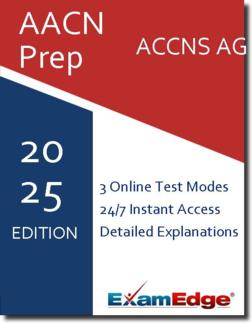AACN ACCNS-AG (ACCNS-AG) Practice Tests & Test Prep by Exam Edge - Topics
Based on 22 Reviews
- Real Exam Simulation: Timed questions and matching content build comfort for your AACN ACCNS-AG test day.
- Instant, 24/7 Access: Web-based AACN Adult-Gerontology Clinical Nurse Specialists practice exams with no software needed.
- Clear Explanations: Step-by-step answers and explanations for your AACN exam to strengthen understanding.
- Boosted Confidence: Reduces anxiety and improves test-taking skills to ace your AACN Adult-Gerontology Clinical Nurse Specialists (ACCNS-AG).

Understanding the exact breakdown of the AACN Adult-Gerontology Clinical Nurse Specialists test will help you know what to expect and how to most effectively prepare. The AACN Adult-Gerontology Clinical Nurse Specialists has multiple-choice questions The exam will be broken down into the sections below:
| AACN Adult-Gerontology Clinical Nurse Specialists Exam Blueprint | ||
|---|---|---|
| Domain Name | % | Number of Questions |
| Clinical Judgment | 61% | 30 |
| Cardiovascular | 13% | 6 |
| Pulmonary | 11% | 5 |
| Endocrine | 3% | 1 |
| Musculoskeletal | 2% | 1 |
| Hematology/immunology/Oncology | 3% | 1 |
| Neurology | 7% | 3 |
| Gastrointestinal | 5% | 2 |
| Renal/Genitourinary | 5% | 2 |
| Integumentary | 2% | 1 |
| Multisystem | 7% | 3 |
| Psychosocial/Behavioral/Cognitive Health | 3% | 1 |
| Professional Caring And Ethical Practice | 39% | 19 |
| Advocacy/moral agency | 5% | 2 |
| Caring Practices | 7% | 3 |
| Collaboration | 5% | 2 |
| Systems thinking | 7% | 3 |
| Response to diversity | 3% | 1 |
| Clinical inquiry | 7% | 3 |
| Facilitation of learning | 6% | 3 |


